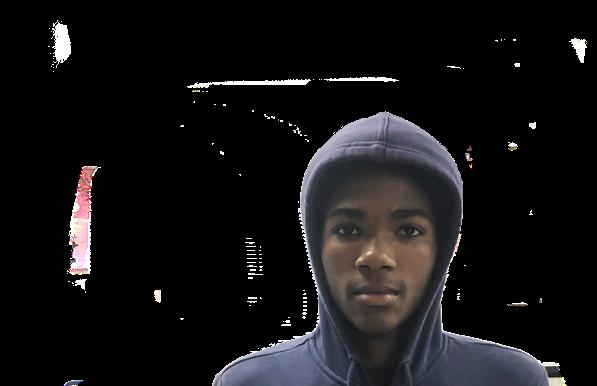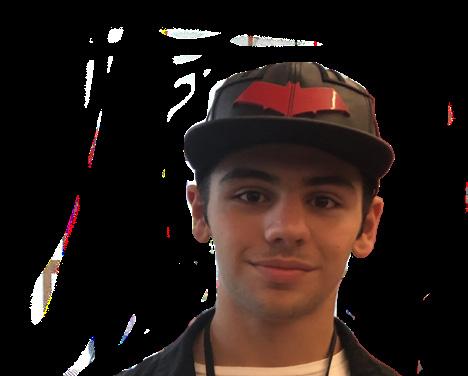
8 minute read
Code red drills and safety

STUDENTS EXPRESS CONCERNS OVER THEIR EFFECTIVENESS From the time they are in kindergarten, children are exposed to school drills. Whether it’s for a fire or a tornado, students are taught at a young age how to follow directions and stay safe. In the past year, Cowboys have become increasingly familiar with code red drills. But that doesn’t mean they have much faith in their efficacy. After the shooting at Marjory Stoneman Douglas High School in February 2018, there was a push for better preparedness for active shooter situations. Florida’s Senate Bill (SB) No. 7026, known as the Marjory Stoneman Douglas High School Public Safety Act, mandates that drills for active shooter and hostage situations take place at least as often as other emergency drills. In Broward County Public Schools, active shooter and hostage situations are designated as “code red.” SB 7026 has resulted in monthly code red drills in schools across the district. Though one might think that monthly drills make students more alert about the threat of school shootings, some students feel that the frequency of code red drills leads to desensitization. “Drills make us used to t h e situation. They make us completely numb to the environment,” junior Sabrina Rapoport said. “The fact that students laugh, talk and are on their phones during our monthly drills shows how insensitive we’ve become to them.” Though the drills are supposed to teach students and teachers what to do in the event of a true code red, many continue to express that the protocol would be abandoned if lives were in danger, particularly if the code was called during lunch or between classes. “There are situations where following the code red drills [would be] useful, if they are a last resort,” senior Henry Ching said. “However, considering the panic a true situation would cause, I doubt that most people would follow the protocols set. I feel that there would be more people doing what they’d feel [to] be most safe, whether that be hiding in the nearest room
Advertisement
o r r u n n i n g out of the school’s vicinity.” If a code red drill occurs during class, the students and teacher will gather in the “hard corner” of the classroom—an area that one would not be able to see from hallways, windows or door openings. These areas have been designated and clearly marked in all CCHS classrooms, and in classrooms across the county. However, despite what their name implies, these corners may not offer much physical protection in the case of an active shooter. In many classrooms, the “hard corner” is located against a wall that separates the classroom from the hallway. Recently, two large holes were made in the walls of the 3900 building’s third-floor science wing. While they have since been repaired, for some students, the sight only emphasized the lack of protection offered by the school’s fragile walls.
“C o n s i d e r i n g I’ve seen holes in walls within the school due to student actions … I really don’t think that the walls would protect students as they are quite hollow,” Ching said. “The designated corners really only serve as a mental safe.” With how common school shootings have become, the importance of precaution is evident. But it appears that the current protocol at CCHS doesn’t do much to put students’ minds at ease. BY ABBIE TUSCHMAN
As public safety becomes a greater concern in society, many individuals have varying opinions on the topic. Whether it is increasing security staff, practicing more drills or implementing metal detectors, CCHS students have many different solutions as to how to keep their school safe. They were asked the question, “what would make you feel safer at school and why?” and here are their responses: man on the street
Photos and reporting by Arielle Kraus WHAT WOULD MAKE CCHS STUDENTS FEEL SAFER AT SCHOOL?



centerspread 13 We have done fire drills passing through classes, but we have never done one at the end of the school day. When you are leaving, there is a big crowd, everyone is scattered everywhere and everyone just wants to get home, but we need to practice drills [at the] end of the day. A lot of schools have metal detectors. Anyone can walk in with something, and we have regulations and security, but it is not stopping anyone from bringing anything to school. CHLOE SIERRA SENIOR “
” “
”I would feel safer at school if there could be specific programs that certain kids could join and find a way that we could all work together to solve the problems at school. I would be [interested] in a student-involved security [program]. We can ask the officers [on campus] if they would like to be involved in those programs with us. “
”EMANUELLE MENENDEZ FRESHMAN [CCHS has] lock-in gates. Keeping track of which gate is open when and for how long gets really confusing. If something were to happen, it would be really hard for anyone to get out and that doesn’t make me feel safe. [The gates] are not keeping anyone from getting in– people can still get in– but getting out is going to be way harder because if you have an actual emergency and are confused, it would be really hard to get out. “
”PIPER BRESLIN JUNIOR I think we need more security. More security would probably allow the hallways and the bathrooms to not be so crowded. [They could be at] the entrance, that way there is not so much clutter. I feel safe at school already. [I would feel safer] if everybody got a personal body guard because [then] nobody ever is going to have a problem. “
”JAADEN NEWEL JUNIOR
JANESSA NUNEZ SOPHOMORE
FOREVER FRESHMAN: A nickname coined by former yearbook sponsor Angela Lawrence given to the individuals in her class who started on the yearbook staff as freshmen. Creating a yearbook consisting of over 300 pages to capture an entire school year is not an easy task. The Round Up yearbook staff at CCHS takes on this challenge annually, working to produce a product that fully captures the memories of the school year. The staff of The Round Up consists of sophomores, juniors and seniors. However, yearbook has a tradition of recruiting one freshman on their staff each year. This tradition began in 2014 when Class of 2018 alumna Morgan Malan was a freshman. Malan requested to join the staff and soon realized that there was not enough coverage on freshman. “Being the only freshman on staff meant that I was the only person who knew my class well enough to be their advocate for coverage,” Malan said. Malan decided to make this a tradition, and as she continued with yearbook, ensured that a freshman was on staff each year. The second individual to continue the tradition was Alex Porras (Class of 2019), followed by Kimber Counts (Class of 2020), Summer Testa (Class of 2021), Sarah Marks (Class of 2022) and now Grace Jenkins (Class of 2023). “I think the tradition of recruiting a freshman is really cool,” The Round Up yearbook sponsor Hailee Yaeger said. “I think it is exciting for them because they’re coming into high school with such an interesting experience, getting to know new people off the bat that are not just freshman, but in every single grade and I think it helps them get out of their shell.” Entering a class full of sophomores and upperclassmen can be very intimidating for a freshman. The Round Up staff assists this student in adjusting to their new routine and lends them a helping hand when needed. “It started out pretty intimidating when I didn’t know anyone, but then once I got comfortable with the people, it’s pretty cool. They are almost like my family,” Jenkins said. “They [have] taught me how to use eDesign to layout the book and basic interviewing tips for high school.” Joining yearbook at a young age allows a freshman to learn the ropes quickly, and earn editor positions within The Round Up during their high school years. Testa has gone from being a staff member freshman year to becoming the youngest EIC The Round Up has ever had in only her junior year of high school. “I am so honored to be the youngest EIC because I have put a lot of work into all the books I’ve made over the years and it’s just such a true statement to all of the work I’ve put in,” Testa said. “I love that I’ll be able to carry on with my staff next year and I am just so grateful for the opportunity and the people who have helped me get here.” The tradition has given those “forever freshmen” a chance to come into high school with an automatic group of friends and a better chance to become an editor and dedicate themselves to an extracurricular they love. But the “forever freshmen” alumni of The Round-Up are even more grateful for their four years on staff because it established a special connection between them, CCHS and their peers. “I loved each and every one of my classmates,” Malan said. “Spending four years knowing every single name and face and extracurricular activity just made me feel that much closer to them and that much more proud of them once we graduated and even now.” A CLOSER LOOK AT THE ROUND UP’S FRESHMAN TRADITION BY ARIELLE KRAUS “IT STARTED OUT PRETTY INTIMIDATING WHEN I DIDN’T KNOW ANYONE, BUT THEN ONCE I GOT COMFORTABLE WITH THE PEOPLE, IT’S PRETTY COOL. THEY ARE ALMOST LIKE MY FAMILY.” -GRACE JENKINS FRESHMAN
A timeline of The Round Up’s “forever freshmen
Summer Testa Class of 2021
Grace Jenkins Class of 2023









